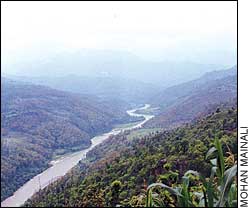 Monsoon mists slide through the forests. In the valley below, the Arun river flows placidly southwards, and the terraces sway with ripening corn. It is hard in the idyllic hills of eastern Nepal to imagine that fear and death stalk the villages. And it is even more difficult to imagine how the November general elections can be held here.
Monsoon mists slide through the forests. In the valley below, the Arun river flows placidly southwards, and the terraces sway with ripening corn. It is hard in the idyllic hills of eastern Nepal to imagine that fear and death stalk the villages. And it is even more difficult to imagine how the November general elections can be held here. The usual bustle of Khandbari's bazar is gone. Small groups huddle in the teashops, whispering and warily scanning the streets outside. The town has been under a dusk to dawn curfew since 26 November.

"You might be an informer, or even a Maoist, why should I talk to you?" asks a young man at the local inn, his eyes averted. Four months ago, Maoists beat and threatened to kill him. The boy fled his Barabise home and came to Khandbari. "He still hasn't gotten over it," his lodge owner explained. "His wounds have healed, but his mental scars are deeper."
Lonely party flags flutter over the roofs of political party offices here in the district headquarters of Sankhuwasabha. But the offices are deserted. Everyone we spoke to last week is just trying to get by: survive from day to day, maybe catch up on the World Cup. An election is the last thing on people's minds.
"I don't think we can hold elections if the Maoists oppose them," DDC chairman Tulsi Prasad Neupane told us bluntly. "Even if the military guards voting centres, I don't think people will come out and vote."
Sankhuwasabha is the equivalent of Rolpa in the east. This is where the Maoists began organising their eastern command, and spread towards Taplejung. Even though their presence here is not as strong, one-fourth of the villages are under the sway of Maoists. VDC officials have been forced to resign, and many have moved to Khandbari or Chainpur. VDC buildings have been torched, and all records destroyed.
Most local members of the Nepali Congress and the RPP have already been killed or have fled. "Some of those still around can be seen at the fortnightly all-party meetings, and that is about all the political activity happening around here," says Dambar Khadka of the UML. Khadka says it is getting difficult for the UML, too, but his cadres are still in the villages. Some UML party workers have dealt with Maoists, and because of that have been picked up for questioning by security forces.
Now, the elections will make the UML a target of the Maoists, many of whom are ex-UML themselves, and will have scores to settle. Senior officials like Basu Shakya, Badri Hang Lingthepu and Netra Regmi in the Maoist's "district people's government" are all ex-UML.
Maoists come at night and threaten to kill villagers if they don't feed and lodge them, says the UML's Karki. The next day, security officials visit those who were forced to give shelter. Karki cuts us short, and refuses to say any more: "Let's leave it at that."
Locals like Suman Shakya are caught between the army and the Maoists. Shakya owns a photo shop, and was recently taken in for questioning by the security forces for filming a Maoist meeting at Barabise. He was beaten up in the barracks and forced to sign a surrender confession. The Maoists had forced him to film the public meeting. He is not a Maoist, nor does he sympathise with them. Now he is afraid of both sides.
We asked CDO Hari Krishna Khatiwada if Shakya's story was true. "I heard that he was tortured, but it happened before I knew he had been taken in. Now torturing those who want to surrender has stopped."
The government's writ does not go beyond the confines of the district headquarters. Even Tumlingtar airport is not secure, and every day policemen walk down from the Khandbari station before the flight from the Kathmandu arrives. They trek back up when the flight leaves. "They could come out of anywhere," a policeman walking with us said, pointing to the thick sal forest along the trail.
Actually, it may not be too difficult to bring the Maoists under control. Security sources estimate there are only 100 hardcore Maoist militia in the area. But with threats and intimidation that has been enough to prevent distribution of voter IDs. When the government forced villagers to apply for voting cards, the Maoists captured the cameras and election field teams.
CDO Hari Krishna Khatiwada admits that only a quarter of eligible voters may have IDs. But he has his orders: make sure elections are held. "We will try to have as many polling booths as we had in the 1999 election," he told us optimistically, but admitted it will depend on the security situation.
Nepali Congress worker, Sher Bahadur Ban has serious doubts about the polls taking place. "You're joking, right?" he says. "You can't even hold SLC exams here, how can you hold elections?"
As elsewhere, there is a steady depopulation of the hills. Many villagers are either in Khandbari, the better off are in Kathmandu, others have migrated to India, or are trying find work in Malaysia or Qatar. Says a teacher in Khandbari: "We have just received a new order from the Maoists. Either pay five percent of the salary as revolutionary tax, or get out."


